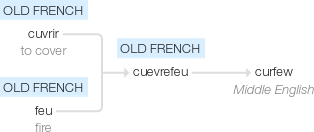Curfew
Middle English (denoting a regulation requiring people to extinguish fires at a fixed hour in the evening, or a bell rung at that hour): from Old French cuevrefeu, from cuvrir ‘to cover’ + feu ‘fire’. The current sense dates from the late 19th century.
wiktionary
From Anglo-Norman coeverfu and Old French cuevre-fu (French couvre-feu), from the imperative of covrir(“to cover”) + fu(“fire”).
etymonline
curfew (n.)
early 14c., curfeu, "evening signal, ringing of a bell at a fixed hour" as a signal to extinguish fires and lights, from Anglo-French coeverfu (late 13c.), from Old French cuevrefeu, literally "cover fire" (Modern French couvre-feu), from cuevre, imperative of covrir "to cover" (see cover (v.)) + feu "fire" (see focus (n.)). Related: Curfew-bell (early 14c.).
The medieval practice of ringing a bell (usually at 8 or 9 p.m.) as an order to bank the hearths and prepare for sleep was to prevent conflagrations from untended fires. The modern extended sense of "periodic restriction of movement" had evolved by 1800s.
